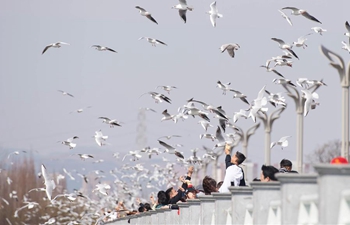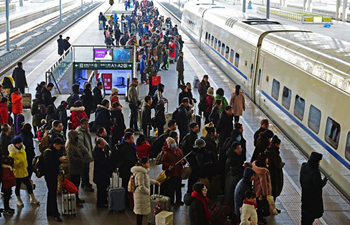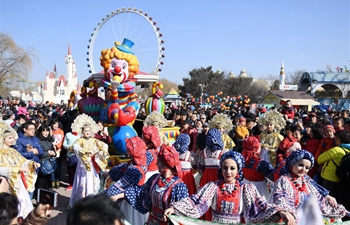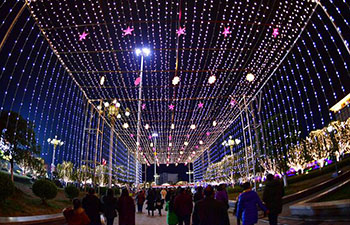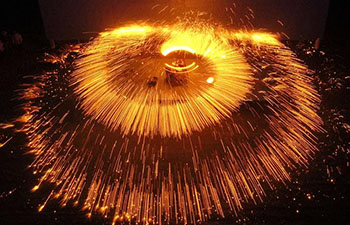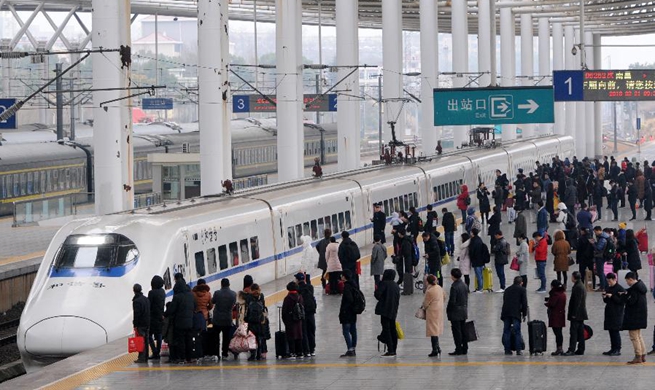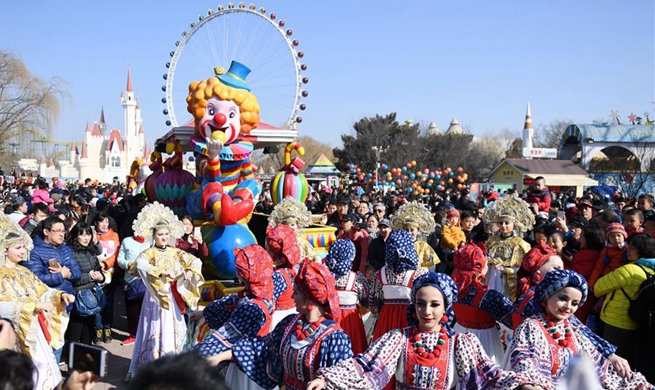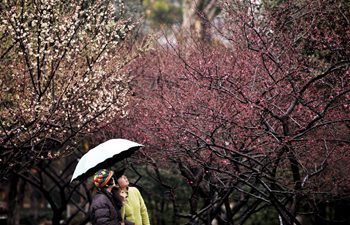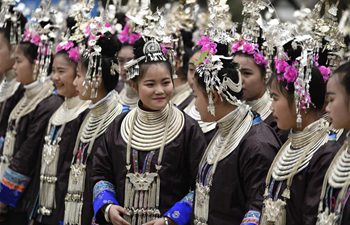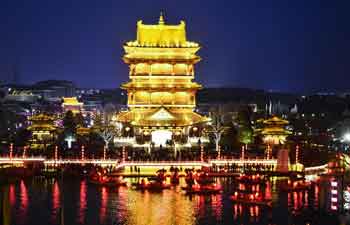DUBAI, Feb. 21 (Xinhua) -- With Saudi Arabia pushing ahead reform of its oil-based economy, companies from the kingdom and the neighboring Gulf country United Arab Emirates (UAE) currently expand their trade and business relations to new highs.
Both being major oil suppliers, two-way trade between the UAE and Saudi Arabia is less focused on energy exchange but on non-oil sectors such as real estate, consumer goods, investments and tourism.
Earlier this month, Dubai's Rove Hotels, a subsidiary of the Middle East's biggest developer Emaar Properties, expanded to Saudi Arabia with first hotel in King Abdullah Economic City's (KAEC) Bay La Sun waterfront district.
KAEC is a multibillion dollar mega real estate and infrastructure project located at the Red Sea coast, 100 km north of Jeddah.
"The expansion complements the goals of the Saudi Vision 2030 to drive economic diversification with tourism development as a strategic growth area," said Olivier Harnisch, CEO of Emaar Hospitality Group.
Vision 2030 was launched by the Saudi Crown Prince in April 2016 and aims to increase the value of non-oil revenues to 1 trillion U.S. dollars within 12 years from the current 163 billion dollars. The share of non-oil exports, in addition, shall swell to 50 percent from 16 percent.
Earlier last week, CEO of Saudi Arabia's government-controlled General Entertainment Authority Faisal S. Bafarat said that his country would not only plan to re-open cinemas after a 39-year hiatus but also put itself on the global map for festivals, sports events and family entertainment.
He said so at the 6th World Government Summit in Dubai, the business, trade and tourism hub of the UAE, adding that 2017 was already a watershed "as we delivered 2,000 entertaining events and festivals across the country compared to 52 in 2016."
Bafarat said 50 percent of the country's 32 million inhabitants are aged under 25, and their desires drive the change.
Moreover, Saudi women will be allowed to drive by mid-2018, a first in the history of the conservative country since its foundation in 1932.
In October last year, the UAE and Saudi Arabia announced that they would expand cooperation to boost investment and trade.
It is reported that there was a 30 percent increase in non-oil trade between the two countries in the last six years which increased from 15 billion dollars in 2011 to more than 19.5 billion dollars in 2016.
Saudi companies are eager to expand to the UAE as the Emirati business metropolis "offers ample advantages as a logistics and trade hub for the Middle East and beyond," said Abdulmajeed Alenazi, brand manager at Saudi Arabian food firm Astra Farms.
The firm, as one of the biggest producers of quail and poultry in the region, participated in the ongoing Gulfood in Dubai, the world's biggest trade fair for food and beverages.
Astra is located in Tabuk, in the fertile northwest of Saudi-Arabia "just near the area where our government will build Neom, a 26,500 square km large 500 billion dollars Mega City to spur economic diversification," he added.
Neom, an acronym of the words 'Neo' (new) and Mustaqbal (Arabic for 'future'), was launched by Crown Prince Mohammed Bin Salman in September 2017 in Riyadh at the Future Investment Forum.
Speaking at the forum, the crown prince announced the ultra-conservative kingdom, home of the two holy mosques of Islam in Mecca and Medina, would return to a moderate Islam which the country has seen before 1979.
He also said that he has appointed German industry veteran Klaus Kleinfeld as Neom's CEO. Kleinfeld is the former CEO of German hi-tech giant Siemens and of U.S. aluminium company Alcoa which has entered into a joint venture with Saudi blue chip firm Ma'aden, a producer of metals.
Astra has likewise ambitions to go public. "We consider to list shares on the Riyadh stock market Tadawul by 2019, albeit no final decision has been taken as yet," said Alenazi.
Earlier in the week, UAE Minister of Economy and Foreign Trade Sultan Al-Mansouri said both countries enjoy strong bilateral relations, which are connected via solid ties based on shared culture, history and noble Islamic and Arab values, UAE state news agency WAM reported.
He affirmed that the decision of President Sheikh Khalifa Bin Zayed Al-Nahyan to form a joint cooperation committee, which includes the military, politics, economy, and culture sectors, represents another important step in expanding the prospects and levels of cooperation between both countries.
At Dubai International Airport, Saudi Arabian Airlines has its own check-in hall at terminal one. Flight bookings, for business class seats in particular, between Dubai and Riyadh have skyrocketed in recent months, and so did the demand for products offered online by the commercially savvy Saudi and Emirati youth.
This motivated Mohammed Alabbar, the chairman of Dubai's Emaar Properties and a close advisor and confident of UAE Vice President Sheikh Mohammed Bin Rashid Al-Maktoum, to clinch a deal in December last year between his privately owned e-commerce provider Noon and Saudi Arabia's United Electronics Company.
Under the strategic agreement, Noon establishes the Saudi electronics giant as its exclusive partner for a range of consumer electronics and home appliance items of well-known global brands.




